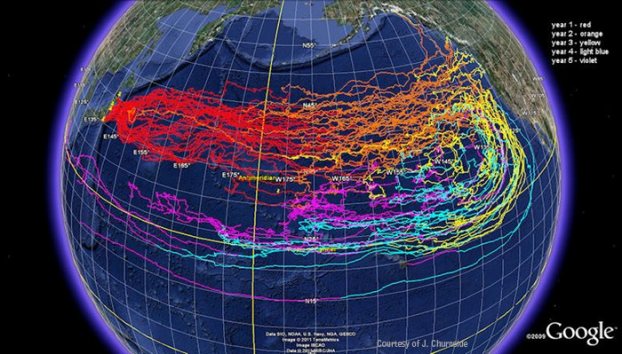Was The World’s ‘Northern-Most Island’ Erased From Charts?
by Kevin Hamilton (University of Hawaii) In 2021, an expedition off the icy northern Greenland coast spotted what appeared to be a previously uncharted island. It was small and gravelly,...


The World Ocean Council (WOC) is reaching out to the maritime community and vessels transiting between Japan and North America for information and observations of marine debris from the tsunami that devastated Japan on March 11, 2011.
“Reporting on the tsunami debris is an important and immediate opportunity for leadership companies to support the better understanding our changing oceans,” stated Paul Holthus, WOC Executive Director. He added that “Commercial vessels of all sorts provide a cost-effective platform for collecting ocean, weather and climate data where few other options exist. The World Ocean Council is working to coordinate and scale up this valuable role of industry observations through our ‘Smart Ocean/Smart Industries’ program.”
As the surge of water from the tsunami receded, it washed tons of debris out into the Pacific Ocean: everything from boats and pieces of crumbled buildings to appliances and all kinds of plastic, metal, and rubber objects.
Nearly a year later, the Marine debris is predicted to move across the North Pacific toward North America and Hawaii, with forecasts indicating that debris remaining afloat could reach the Northwestern Hawaiian Islands during the current winter and arrive at the west coast of North America in 2013.
However, there is still substantial uncertainty over exactly how much and what types of debris are still floating and where it is located. The initial debris fields observed soon after the tsunami have dispersed. The heavier objects are likely to have sank, but the types of debris that may still be afloat include vessels, fishing nets and buoys, lumber, cargo containers, and household goods.
To help report marine debris, WOC encourages ships to submit observations and photos of marine debris – as well as reports of ‘no debris observed’ – to: [email protected]
“NOAA is leading efforts to collect data, assess the debris and reduce possible impacts to our natural resources and coastal communities,” said David Kennedy, National Oceanic and Atmospheric Administration (NOAA) assistant administrator for the National Ocean Service. “Information from vessels operating in the North Pacific will provide vital documentation of the movement of the tsunami debris, and we appreciate the World Ocean Council’s help in reaching out to the ocean industry and vessel operators who can assist with gathering this data.”
You can also help by downloading the Marine Debris Tracker app for iPhone and Android phones.
Read: Tracking Marine Debris from the Japanese Tsunami
Join the gCaptain Club for curated content, insider opinions, and vibrant community discussions.


Join the 105,911 members that receive our newsletter.
Have a news tip? Let us know.
Access exclusive insights, engage in vibrant discussions, and gain perspectives from our CEO.
Sign Up




Maritime and offshore news trusted by our 105,911 members delivered daily straight to your inbox.



Essential news coupled with the finest maritime content sourced from across the globe.
Sign Up